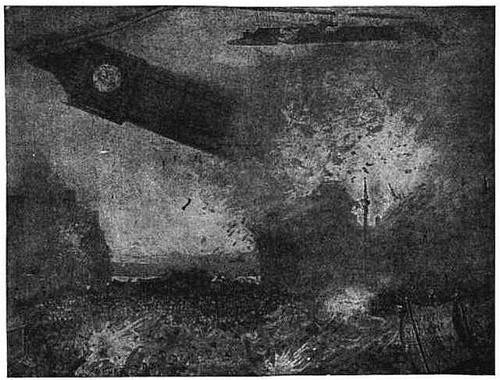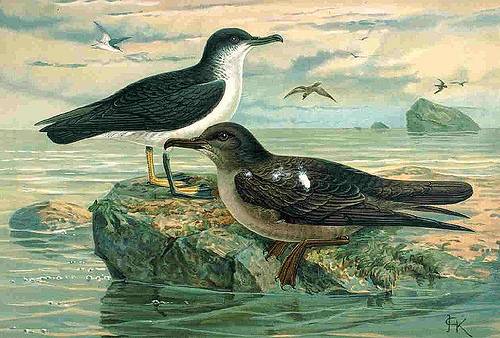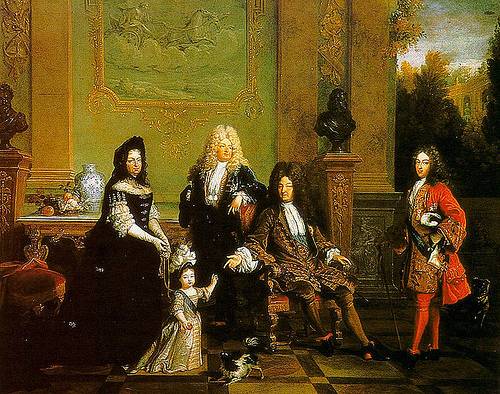
Author: Greg Ross
In a Word
clerisy
n. learned persons as a class; intelligentsia
The Blitz Previewed

E. Douglas Fawcett’s 1893 story “Hartmann the Anarchist” described an aerial bombardment of London — 47 years before World War II:
With eyes riveted now to the massacre, I saw frantic women trodden down by men; huge clearings made by the shells and instantly filled up; house-fronts crushing horses and vehicles as they fell; fires bursting out on all sides, to devour what they listed, and terrified police struggling wildly and helplessly in the heart of the press.
Hartmann rains dynamite bombs, shells, and blazing petroleum from his airship before a mutiny brings him down. “It has not been my aim to write history,” writes the narrator. “I have sought to throw light only on one of its more romantic corners.”
See also Wreck of the Titan and A Blindfold Bullseye.
Frequent Flyer

In 1957 ornithologists marked a Manx shearwater, a migrating seabird, on Bardsey Island off Wales.
In April 2002 they discovered the same bird was still alive and still gamely flying to South America each winter.
In the intervening 45 years, they calculated, it had covered 5 million miles.
See also Longest Migration.
“A Good Catch”
The following is a good catch: lay a wager with a person that to three observations you will put to him, he will not reply ‘a bottle of wine.’ Then begin with some common-place remark, such as, ‘We have had a fine, or wet, day to-day,’ as it may be; he will answer, of course, ‘a bottle of wine.’ You then make another remark of the same kind, as, ‘I hope we shall have as fine or finer to-morrow,’ to which he will reply, as before, ‘a bottle of wine.’ You must then catch him very sharply, and say, ‘Ah! there, sir! you’ve lost your wager;’ and the probability is, if he be not aware of the trick, he will say ‘Why, how can you make that out?’ or something similar, forgetting that, though a strange one, it is the third observation you have made.
— Samuel Williams, The Boy’s Treasury of Sports, Pastimes, and Recreations, 1847
Unquote

“Look. I have two kinds of acting. One on a horse and one off a horse. That’s it.” — Robert Mitchum
Precocious
Though she died at age 8, Marjory Fleming (1803-1811) had the soul of a mature writer. Her diary became hugely popular in Victorian London:
I am now going to tell you the horrible and wretched plaege that my multiplication table gives me; you cant conceive it. The most Devilish thing is 8 times 8 and 7 times 7; it is what nature itself cant endure.
And she was rumored to be the favorite poet of Walter Scott, who reportedly told her aunt, “Her repeating of Shakespeare overpowers me as nothing else does.”
Of summer I am very fond,
And love to bathe into a pond;
The look of sunshine dies away,
And will not let me out to play;
I love the morning’s sun to spy
Glittering through the casement’s eye,
The rays of light are very sweet,
And puts away the taste of meat;
The balmy breeze comes down from heaven,
And makes us like for to be living.
In her last illness she offered to recite a poem for her father; when he asked her to choose one, she startled him with Burns’ “Why am I loth to leave this earthly scene?”
See also An Unacknowledged Genius and Child’s Play.
You’re Welcome
You’d pay $1,000 to witness my mastery of the black arts, wouldn’t you? Of course you would.
- Buy a brand-new deck of cards.
- Discard the jokers, cut the deck 13 times, and deal it into 13 piles.
- Now stand back … Ph’nglui mglw’nafh C’thulhu R’lyeh wgah’nagl fhtagn!
- Look at the cards. Presto! They have magically grouped themselves by value — all the aces are in one pile, kings in another, etc.
You owe me $1,000.
Applied Chemistry

Oxyphenbutazone is a metabolite of phenylbutazone.
It’s also the biggest goldmine in Scrabble — play it across three Triple Word Score squares, joining eight tiles that have already been played and extending seven existing words, and you’ll earn 1,780 points with a single play.
Time Is Money

Claude Sanguin, a French poet, who died at the close of the last century, having had his house consumed by lightning, sent the following ingenious card to Louis XIV on the occasion. The monarch at once felt the delicacy of the poet’s verses, and the distress of his situation, and cheerfully ordered him the one thousand crowns which were the object of his demand.
To engage in your matters belongs not to me,
This, Sire, inexcusable freedom would be;
But yet, when reviewing my miseries past,
Of your majesty’s income the total I cast;
All counted, (I’ve still the remembrance quite clear,)
Your revenue’s one hundred millions a year;
Hence one hundred thousand per day in your pow’r,
Divided, brings four thousand crowns to each hour,
To answer the calls of my present distress,
Which lightning has caused in my country recess,
May I be allow’d to request, noble Sire,
Of your time fifteen minutes, before I expire?
— I.J. Reeve, The Wild Garland; or, Curiosities of Poetry, 1866
